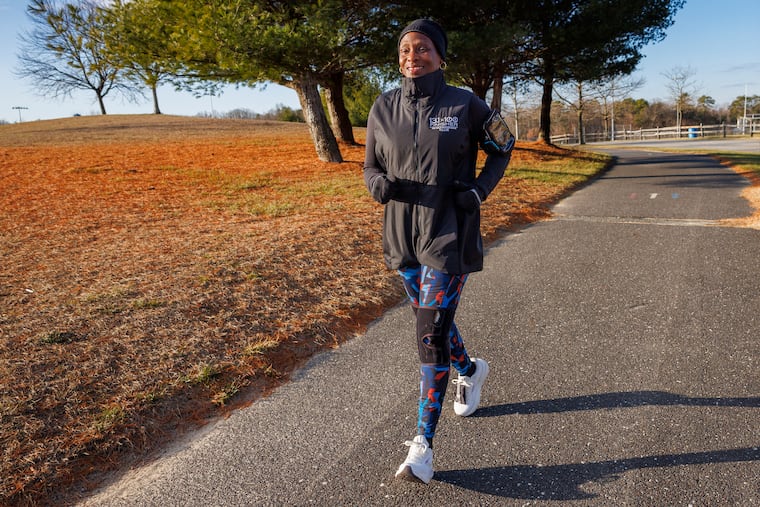New Jersey woman who completed 100 half-marathons inspires me more than any Olympic gold medalist
Denise Hall is a grandmother who started running late in life. But she completed this considerable feat in November and has no plans to slow down now.

If you’re like the rest of us mere mortals, you struggle with New Year’s resolutions to improve your fitness. Studies show that most of those who set those kinds of goals on Jan. 1 quickly give up on them. The second Friday in January is known as Quitters Day because of how many people abandon their resolutions.
I’m in no place to judge. I get it. Each year, I sign up for the annual Broad Street Run 10-miler, which this year takes place May 4, but I haven’t started training for it yet. I just haven’t felt like it this year. But I will. Luckily, I have a new source of running inspiration — Denise Hall, 65, of Gloucester County. Every post she makes on social media about her latest early morning practice runs motivates me.
If you haven’t heard of Hall, it’s probably because she’s not an elite runner or an Olympic track-and-field gold medalist. Nor is she a social media fitness guru with a million followers. She’s actually a grandmother who started running late in life. But in November, she managed to accomplish a considerable feat by completing her 100th half-marathon.
Pause for a moment and let the enormity of that sink in. Statistics are hard to come by, but it’s estimated that only 0.01% of people worldwide complete a marathon of 26.2 miles in their lifetime, and only four-tenths of 1% of them finish even a single half-marathon each year.
What makes Hall’s story even more remarkable is that the former government employee didn’t lace up her first running shoe until she was close to retirement age. She likes to joke that before hitting age 54, she never ran unless a dog was chasing her.
Born in Philly, Hall moved with her family to New Jersey just before she enrolled at Willingboro High School. After graduating in 1977, she entered the U.S. Air Force and served for four years. She went on to hold a variety of positions at the Philadelphia Navy Yard and later at the Social Security Administration’s payment center at Third and Spring Garden Streets.
In 2013, a friend invited her to join Black Girls Run, an African American running group. Hall showed up thinking she would just walk. But then she learned about the group’s couch-to-5K running program with its walking and running intervals. “When I found out that I could do it, I just kept going, and the next thing you know, I’m running, and I went up to a 10K,” Hall recalled.
The following year, she signed up for and completed her first half-marathon. She went on to run four additional half-marathons that same year. When one of her running friends invited her to join her in a race in Massachusetts, Hall enjoyed it so much that she decided to complete a half-marathon in every state.
“I loved it, traveling, getting to see places you never thought you would see,” she told me. “Running is actually relaxing. It clears your mind. You’re just out there. Some people run listening to music. I don’t run with anything in my ear. I just run.”
Running is famously hard on joints. It wasn’t long before Hall began experiencing knee issues and had to start wearing braces and getting injections from her doctor just so she could keep hitting the pavement. But neither her knee pain nor the herniated discs in her back stopped her from completing her goal of running a half-marathon in every state.
She had so much fun doing it that she decided to move the goalpost to 100 half-marathons, which she completed in November. I was amazed when I saw her post on Facebook announcing she had made it. I’ve probably completed about a dozen half-marathons with six months in between each one. I’ve never considered doing as many races in a year as Hall did to meet her goal.
Bennett Brookstein, founder of the Fairmount Running Club, pointed out that not only is it easier to train for half-marathons than the full marathon distance of 26.2 miles, but recovery takes less time, as well. “Once you get conditioned, you can recover quick,” he said. “So you can probably do another within a week or two weeks.”
As for Hall, she has no intention of stopping any time soon. Her aches and pains disappear when she’s out hitting the pavement. If that’s not an inspiration to get moving and stick to your New Year’s resolutions, then I don’t know what is.